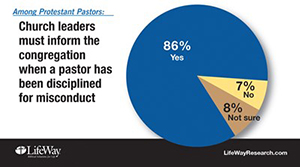Most pastors want misconduct accusations kept confidential
NASHVILLE—Half of Protestant pastors say their colleagues should step down from the pulpit for a time if they are accused of misconduct. Most say such accusations should be kept in confidence until proven. And few think pastors who commit adultery should be permanently banned from ministry.
Those are among the findings of a new telephone survey of 1,000 Protestant senior pastors from Nashville-based LifeWay Research.
“Pastors believe church leaders should be held to high standards,” said Ed Stetzer, executive director of LifeWay Research, based in Nashville. “They also want to protect themselves against allegations that could be false.”
LifeWay Research asked pastors questions about how to handle allegations of misconduct.
Varied views on whether pastor should step aside
Forty-seven percent of the surveyed ministers say a pastor should step aside while church leaders investigate alleged misconduct. About a third (31 percent) say the church should leave the pastor in the pulpit. One in five (21 percent) is not sure.
Older pastors (65 and older) are more likely to want the pastor to stay in the pulpit (36 percent). Younger pastors (ages 18 to 44) are less likely to hold that view (27 percent).
African-American pastors (50 percent) are more likely to want the pastor to remain in the pulpit than white pastors (30 percent). More Baptists (35 percent) and Pentecostals (43 percent) want the pastor to remain than Methodists (24 percent) or Presbyterian/Reformed pastors (24 percent).
Cautious about telling the whole church
Most pastors appear cautious about sharing details of alleged misconduct with the entire congregation. Few respondents (13 percent) say allegations should be shared with all church members. Most (73 percent) say allegations should be kept in confidence by church leaders during an investigation. Fourteen percent are not sure.
Pentecostals (85 percent) are more likely to say allegations should be kept in confidence than Methodists (63 percent).
 Pastors are more comfortable sharing details with the congregation if a pastor has been disciplined for misconduct. Most (86 percent) say it is essential for church leaders to let the congregation know in such cases.
Pastors are more comfortable sharing details with the congregation if a pastor has been disciplined for misconduct. Most (86 percent) say it is essential for church leaders to let the congregation know in such cases.
Pastors and churches alike struggle with how much detail to share with the congregation, especially about alleged misconduct, Stetzer said.
“We don’t have a lot of models of how to have transparent conversations,” he said.
Keep lawsuits in mind
Churches and pastors also need to be aware of legal concerns. A false allegation could lead to a lawsuit for slander, especially if the pastor denies the allegations, said Frank Sommerville, an Arlington attorney who specializes in legal issues facing churches.
“You are walking a tightrope in those early days,” Sommerville said. “It’s easy if the pastor says, ‘Yes, I had an affair.’ If the pastor denies the allegation, you need some kind of investigation to figure out who is most likely telling the truth.”
Have a process to handle allegations
Sommerville suggested churches have a process in place for handling allegations of misconduct, including taking possession of the pastor’s work email, cell phone and computer.
The process should take about 10 days, and Sommerville suggested the pastor step down with pay during the process.
“It’s easy to explain that the pastor is unavailable for one week,” he said. “It’s harder to explain if it takes three months.”
He suggested church leaders—the church board, presbytery, council or other leadership group—keep the allegations confidential until the investigation is over. After a decision is made, they can inform the congregation about some of the details.
Split views on discipline for adultery
In instances specifically regarding allegations of adultery, pastors are split over how long a preacher should step down from public ministry if he has had an affair.
One in four (24 percent) supports a permanent withdrawal from public ministry. A similar number (25 percent) are not sure. About a third (31 percent) say a pastor should step down between three months and a year.
Pastors over age 65 are more likely to want a permanent ban from ministry (28 percent) than pastors age 55-65 (19 percent). Pastors age 45 to 54 are more likely to say from three months to a year is more appropriate (38 percent).
African-American pastors (45 percent) are more likely to say a pastor should leave for three months to a year than white pastors (30 percent).
Lutherans are least willing to reinstate, with half (47 percent) saying an adulterous pastor should leave ministry permanently. Baptists (30 percent calling for permanent withdrawal) are less willing to reinstate than Methodists (13 percent), Pentecostals (13 percent) and Presbyterian/Reformed pastors (11 percent.)
“The Scripture says pastors must be above reproach,” Stetzer said. “So, it’s not surprising that some want to see fallen pastors banned from ministry. Still, pastors are also people who talk about forgiveness regularly and, by and large, they want to see those who fall have a chance at restoration.”
LifeWay Research conducted the phone survey of Protestant pastors March 9-24. The calling list was a stratified random sample drawn from a list of all Protestant churches. Analysts used quotas for church size and black Protestant denominations. Each interview was conducted with the senior pastor or minister of the church called.
Analysts weighted responses by region to reflect the population more accurately. The completed sample is 1,000 surveys, providing 95 percent confidence the sampling error does not exceed plus or minus 3.2 percent. Margins of error are higher in subgroups.